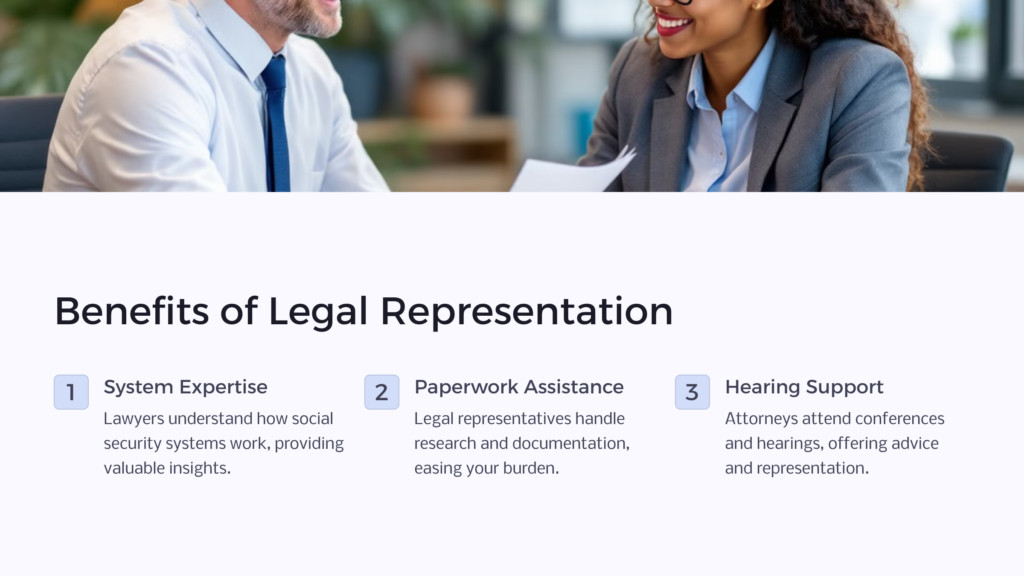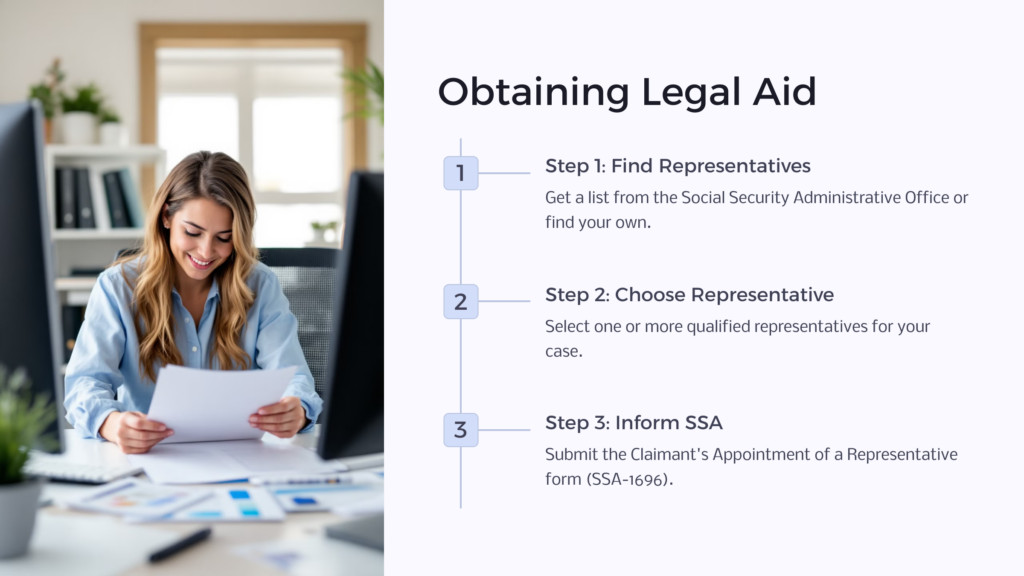Navigating the complexities of Social Security Disability Insurance (SSDI) or Supplemental Security Income (SSI) can be overwhelming, especially when you’re dealing with a disability. Many individuals who need to apply for or appeal a denied disability claim might consider seeking legal representation. However, the cost of a lawyer can be a significant barrier. The good news is that accessing legal help for your social security disability claim might be more affordable than you think – in fact, it can often be free upfront.
Why a Social Security Disability Lawyer is Crucial
 benefits of legal representation infographic
benefits of legal representation infographic
Securing legal representation in a social security disability case offers substantial advantages. Disability law is intricate, involving specific procedures, medical evidence requirements, and legal arguments. A seasoned social security disability attorney understands this landscape intimately and can act as your advocate throughout the entire process.
Here’s how a lawyer can assist you:
- Expert System Navigation: They possess a deep understanding of Social Security Administration (SSA) processes and regulations, ensuring all paperwork is correctly filed and deadlines are met.
- Evidence Gathering: Attorneys are skilled in gathering crucial medical records and evidence necessary to substantiate your disability claim. This includes knowing what documentation is needed and how to obtain it efficiently.
- Hearing Representation: If your case proceeds to a hearing, a lawyer will prepare you for questioning, represent you before an administrative law judge, and present compelling legal arguments on your behalf. They can also cross-examine vocational experts and medical professionals if needed.
- Appeals Process: Should your initial claim be denied (which is common), a lawyer can manage the reconsideration request and subsequent appeals processes, including appeals to the Appeals Council and even Federal Court if necessary.
- Reducing Stress and Burden: Dealing with a disability claim is stressful. A lawyer takes the legal burden off your shoulders, allowing you to focus on your health and well-being.
How to Find Legal Representation for Disability Claims
 Obtain Legal Aid infographic
Obtain Legal Aid infographic
Finding legal assistance for your social security disability claim is accessible. You can start by:
- SSA Referral: The Social Security Administration can provide a list of qualified representatives in your area. This list is a good starting point for finding reputable legal help.
- State and Local Bar Associations: Many bar associations have referral services that can connect you with lawyers specializing in social security disability law.
- Legal Aid Societies: Non-profit legal aid organizations often offer free or low-cost legal services to individuals with disabilities who meet certain income requirements. While they may have resource constraints, it’s worth exploring this option.
- Disability Rights Groups: Organizations dedicated to disability rights advocacy may also provide referrals to attorneys or legal resources.
- Online Directories: Websites specializing in legal directories can help you search for social security disability attorneys in your state or city.
It’s important to remember that while you can have multiple representatives, the SSA regulations specify that an entire firm or corporation cannot be appointed as your representative – it must be individual lawyers or qualified non-attorney representatives. Once you choose a representative, you must officially inform the SSA by submitting form SSA-1696, “Claimant’s Appointment of Representative.”
The “Free Lawyer” Concept: Contingency Fees Explained
The idea of a “free lawyer” for social security disability cases stems from the contingency fee arrangement that most disability lawyers utilize. This means you generally do not pay any attorney fees upfront. Instead, their payment is contingent on you winning your case and receiving back pay.
Here’s how it works:
- No Upfront Fees: You are not required to pay any retainer or hourly fees to hire a social security disability lawyer working on a contingency basis.
- Payment from Back Pay: If your disability claim is approved, the lawyer’s fee is directly paid out of your past-due benefits, also known as back pay.
- Fee Cap: The Social Security Administration regulates these fees. Typically, the lawyer’s fee is capped at 25% of your back pay or a maximum of $6,000, whichever is less. This regulation protects claimants from excessive legal fees.
- No Win, No Fee: If, unfortunately, your disability claim is not successful, you generally do not owe the lawyer any attorney fees. This significantly reduces the financial risk for claimants.
This contingency fee system makes legal representation accessible to individuals who might otherwise be unable to afford it, ensuring that financial constraints do not prevent people with disabilities from obtaining qualified legal help.
Understanding Back Pay in Disability Cases
Back pay is a crucial aspect of social security disability benefits and lawyer fees. It refers to the accumulation of benefits owed to you from the time you became eligible for disability benefits until your claim is approved.
Key points about back pay:
- Benefit Accrual: Back pay starts accruing either from your disability onset date (the date your disability began) or the date you applied for disability benefits, depending on whether you are applying for SSDI or SSI, and which date is later.
- Lump Sum Payment: When your claim is approved, you will receive your back pay in a lump sum, representing the accumulated benefits.
- Source of Lawyer Fees: It’s from this back pay lump sum that your lawyer’s contingency fee is deducted, if applicable.
Understanding back pay helps clarify how lawyers can represent you without upfront costs – their fees are directly tied to the successful outcome of your claim and are paid from the benefits you are awarded.
When Could Lawyer Fees Exceed the Standard Cap?
While the 25%/$6,000 fee cap is standard, there are limited situations where a lawyer might petition for a higher fee. These instances are rare and require SSA approval:
- Federal Court Appeals: If your case needs to be appealed to the federal court level, which is beyond the Appeals Council, the attorney may need to request a fee petition to cover the additional work and complexity involved.
- Successive Attorneys: If you change attorneys during your claim process, and both attorneys contribute to the successful outcome, fees might need to be divided or adjusted, potentially requiring a fee petition to ensure fair compensation for each lawyer’s work.
Fee Petitions: Seeking Approval for Higher Fees
A fee petition is a formal request submitted by your attorney to the Social Security Administration asking for permission to charge a fee exceeding the standard 25% of back pay or $6,000 limit.
The SSA carefully scrutinizes fee petitions, considering factors such as:
- Attorney’s Effort and Time: The SSA assesses the amount of work the attorney invested in the case, including time spent on research, hearings, appeals, and client communication.
- Case Complexity: More complex cases involving intricate medical issues, extensive appeals, or novel legal arguments may justify higher fees.
- Attorney’s Experience and Expertise: The lawyer’s level of skill and experience in social security disability law is also taken into account.
- Benefit Amount Secured: The amount of back pay and future benefits secured for the client is considered in relation to the requested fee.
You have the right to formally object to a fee petition if you believe the requested fee is unreasonable. The SSA will review your objection and make a final decision on the fee petition.
Case Expenses: What You Might Need to Pay
It’s crucial to distinguish between attorney fees and case expenses. While you might not pay attorney fees upfront, you may be responsible for certain out-of-pocket expenses related to your case, regardless of the outcome.
Common case expenses can include:
- Medical Records Costs: Obtaining medical records is essential for disability claims, and while your attorney can assist in requesting them, the providers often charge fees for copies.
- Travel Expenses: If hearings or meetings require attorney travel, you might be asked to cover reasonable travel costs.
- Long-Distance Communication Costs: Expenses for long-distance calls or postage related to your case can be considered case expenses.
- Expert Witness Fees: In some complex cases, expert witness testimony (e.g., from medical professionals) might be necessary, and their fees could be considered case expenses.
When you hire a disability lawyer, they will typically provide you with an expense agreement outlining what types of expenses you are responsible for. It’s important to discuss these potential costs upfront to avoid surprises.
What Happens If Your Disability Claim is Denied?
Claim denial is a common part of the social security disability process. If your initial claim is denied, you have options:
- Appeal (Reconsideration, Hearing, Appeals Council): You have the right to appeal a denied claim. This involves several stages:
- Reconsideration: A complete review of your claim by a different SSA decision-maker.
- Administrative Law Judge (ALJ) Hearing: If reconsideration is denied, you can request a hearing before an ALJ who will review your case and hear testimony.
- Appeals Council: If the ALJ hearing is unfavorable, you can appeal to the Appeals Council, which reviews decisions for legal errors.
- Reopen a Previous Claim: In some situations, instead of appealing, you might consider reopening a previously denied claim, especially if you have new and material evidence or if your condition has worsened. You can also file a new claim, and potentially have it related to a prior claim in certain circumstances.
A social security disability attorney can guide you through the appeals process, advise on the best course of action (appeal vs. reopen), and continue to represent you at each stage, all while still operating under the contingency fee arrangement.
Benefits.com Advisors
 benefits.com advisors
benefits.com advisors
For further guidance on navigating social security benefits and disability claims, resources like Benefits.com Advisors can offer valuable support and connect you with experts familiar with federal, state, and local programs. They can help you understand the programs best suited to your individual needs.
